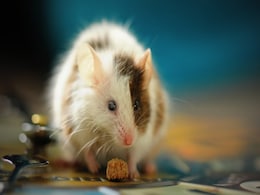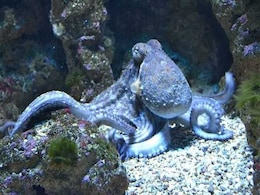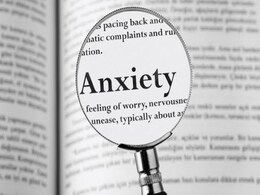Current Biology Journal
- All
- News
-

Placebo Effect Link Discovered With Previously Unassociated Parts of the Brain
- Sunday September 8, 2024
- Written by Gadgets 360 Staff
Patients suffering from chronic pain have limited treatment options, often relying on medications like opioids that come with harmful side effects and high addiction risks. A new study in mice, published in Current Biology journal, suggests a new way to use the placebo effect for treating chronic pain. By activating specific neurons in the brain li...
-
 www.gadgets360.com
www.gadgets360.com
-

Human Ancestors Must Have Co-Existed With Dinosaurs, Researchers Say
- Thursday June 29, 2023
- World News | Edited by Anjali Thakur
The study says that early mammals evolved before a massive asteroid hit the planet 66 million years ago and therefore lived briefly with dinosaurs.
-
 www.ndtv.com
www.ndtv.com
-

Scientists Believe This Is Quickest Method For Comforting A Crying Baby
- Thursday September 15, 2022
- Offbeat | Edited by Nikhil Pandey
According to the research, carrying a crying baby on a five-minute walk is the most effective method of soothing them.
-
 www.ndtv.com
www.ndtv.com
-

Monday Motivation: Here's How Taking Short Breaks Can Help You Learn New Skills Better
- Monday April 15, 2019
- IANS
The study, published in the journal Current Biology, suggests our brains probably take short rest periods to strengthen memories.
-
 doctor.ndtv.com
doctor.ndtv.com
-

This Is What Happens To A Shy Octopus On Ecstasy
- Friday September 21, 2018
- Science | Ben Guarino, The Washington Post
If you give an octopus MDMA, it will get touchy and want to mingle. What sounds like the premise of a children's book set at Burning Man is, in fact, the conclusion of a study published Thursday in the journal Current Biology. Neuroscientist Gul Dolen, who studies social behavior at the Johns Hopkins University School of Medicine, and octopus ex...
-
 www.ndtv.com
www.ndtv.com
-

People With Anxiety Perceive The World Differently: Study
- Friday March 11, 2016
- Health | Press Trust of India
People with anxiety fundamentally perceive the world differently, a new study has found, suggesting that they are not able to distinguish between safe or dangerous situations.
-
 www.ndtv.com
www.ndtv.com
-

Placebo Effect Link Discovered With Previously Unassociated Parts of the Brain
- Sunday September 8, 2024
- Written by Gadgets 360 Staff
Patients suffering from chronic pain have limited treatment options, often relying on medications like opioids that come with harmful side effects and high addiction risks. A new study in mice, published in Current Biology journal, suggests a new way to use the placebo effect for treating chronic pain. By activating specific neurons in the brain li...
-
 www.gadgets360.com
www.gadgets360.com
-

Human Ancestors Must Have Co-Existed With Dinosaurs, Researchers Say
- Thursday June 29, 2023
- World News | Edited by Anjali Thakur
The study says that early mammals evolved before a massive asteroid hit the planet 66 million years ago and therefore lived briefly with dinosaurs.
-
 www.ndtv.com
www.ndtv.com
-

Scientists Believe This Is Quickest Method For Comforting A Crying Baby
- Thursday September 15, 2022
- Offbeat | Edited by Nikhil Pandey
According to the research, carrying a crying baby on a five-minute walk is the most effective method of soothing them.
-
 www.ndtv.com
www.ndtv.com
-

Monday Motivation: Here's How Taking Short Breaks Can Help You Learn New Skills Better
- Monday April 15, 2019
- IANS
The study, published in the journal Current Biology, suggests our brains probably take short rest periods to strengthen memories.
-
 doctor.ndtv.com
doctor.ndtv.com
-

This Is What Happens To A Shy Octopus On Ecstasy
- Friday September 21, 2018
- Science | Ben Guarino, The Washington Post
If you give an octopus MDMA, it will get touchy and want to mingle. What sounds like the premise of a children's book set at Burning Man is, in fact, the conclusion of a study published Thursday in the journal Current Biology. Neuroscientist Gul Dolen, who studies social behavior at the Johns Hopkins University School of Medicine, and octopus ex...
-
 www.ndtv.com
www.ndtv.com
-

People With Anxiety Perceive The World Differently: Study
- Friday March 11, 2016
- Health | Press Trust of India
People with anxiety fundamentally perceive the world differently, a new study has found, suggesting that they are not able to distinguish between safe or dangerous situations.
-
 www.ndtv.com
www.ndtv.com








